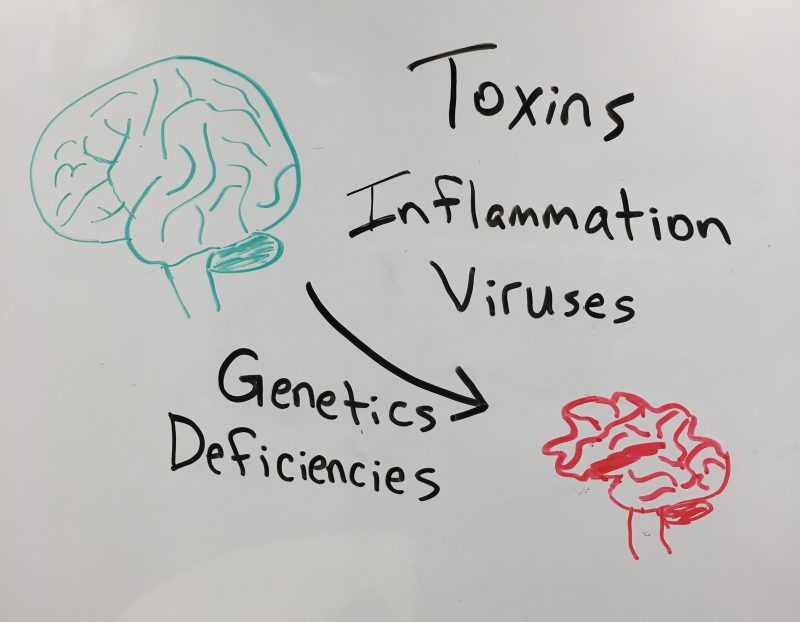What is Alzheimer’s Disease?
Alzheimer’s Disease (ASD) is a form of dementia that affects memory, thinking, and behavior, primarily in older individuals; the majority of people with ASD are over 65. The most important thing to know about Alzheimer’s is that it is not a normal part of aging, and it can be prevented through lifestyle choices. The disease progresses from mild memory loss during the early stages to inability to carry a conversation or respond to environment as an affected individual approaches death.
What Goes Wrong in the Brain?
There are two structures that appear in ASD brains that experts point to as primary characteristics of the disease:
- Beta-Amyloid Plaques – protein fragments that build up in between nerve cells
- Neurofibrillary Tangles – tangled tau proteins that build up in cells
These plaques and tangles build up specifically in brain areas important for memory before other areas in Alzheimer’s patients, such as the hippocampus. The plaques and tangles are not well understood by scientists, but we do know that they can destroy nerve cells, leading to memory loss.
The two buildups in the brain are caused by a variety of factors, and they are classified into three types of Alzheimer’s Disease:
Type 1 – Genetic and inflammatory based
Type 2 – Hormones and infection based
Type 3 – Brain pathway dysfunction
While the physiological mechanisms that lead to ASD are complex, there are 5 medically proven ways that can prevent all forms of Alzheimer’s.
How Can the Disease Be Prevented?
The first thing to understand about preventing ASD is that 99% of drugs that have been formulated to treat the disease have failed. In fact, when drugs that target Beta-Amyloid plaque in the brain are used, ASD can get worse because Beta-Amyloid is a protein the brain produces to protect itself against inflammation.
Secondly, some people are more genetically predisposed to develop the disease. The gene that is most commonly associated with late-onset Alzheimer’s is the APOE gene, which can be tested for. However, many people who have this gene don’t get Alzheimer’s, and many people get the disease who don’t have the APOE gene. So, here are the five clinically proven markers to keep under control to prevent ASD.
- Inflammation
Most people are aware that chronic inflammation can lead to disease. However, many people don’t know exactly how to avoid and prevent inflammation. The three most important factors to ditch chronic inflammation are diet, exercise, and sleep:
Diet
- Eat much more omega-3s than omega-6s, which means more fish and flaxseed and less vegetable oil.
- Avoid processed foods and sugars.
- Avoid foods that are commonly inflammation triggering, such as gluten and dairy.
Exercise
- Make sure to strength train at least 2 days a week.
- However, know how your body responds to exercise and don’t over train.
Sleep
- Get at least 7 hours of sleep per night, or up to 9 hours depending how much your body needs.
- Getting the same amount of sleep every night is best.
- Nutritional deficiencies
Lab testing can be performed to measure nutritional deficiencies. Common deficiencies include iron, iodine, vitamin B, vitamin B12, calcium, and magnesium. Any of these deficiencies can have adverse health effects, and they can be simply supplemented for when the deficiency is known.
- Toxic exposures
There are over 77,000 man-made chemicals in the environment, so it is impossible to avoid all of them, but measures can be taken to reduce toxic exposure.
- Drink reverse-osmosis water – city water can be contaminated with halogens, antibiotics, and other prescription drugs.
- Take preventative measures in situations with high toxic exposure risk
- Use natural health/beauty products – deodorants and soaps are loaded with toxic chemicals
- Genetics
Some people are more genetically predisposed for Alzheimer’s (APOE gene mentioned previously). By getting a genetic test, you can learn if you are at risk, and diet and lifestyle recommendations will be made by a health expert.
- Viruses and infections
The presence of a virus such as herpes can cause chronic inflammation. Viruses can be repressed if the immune system is functioning properly. The best ways to boost immune function is through proper diet, exercise, sleep, and supplementation.
